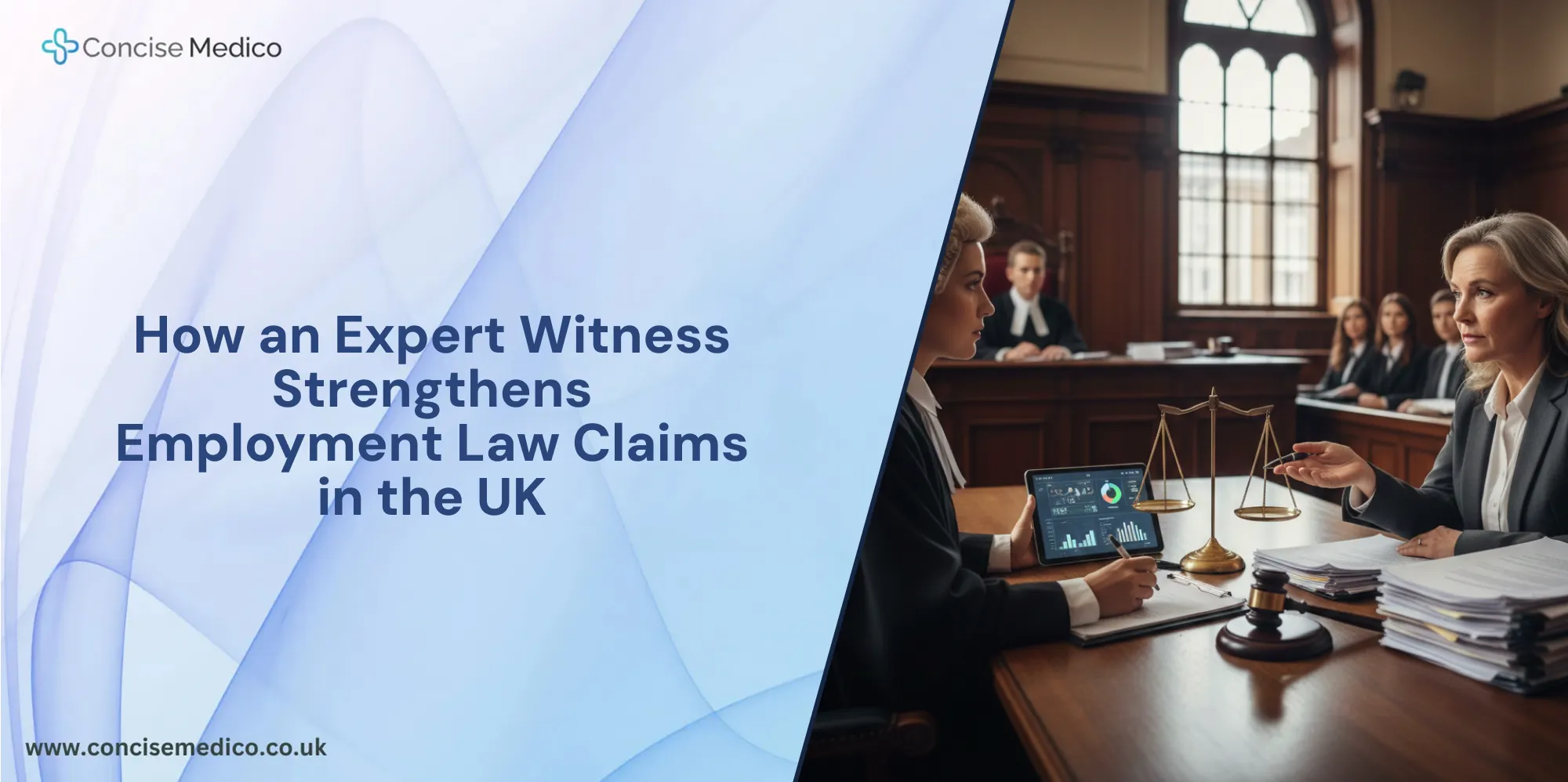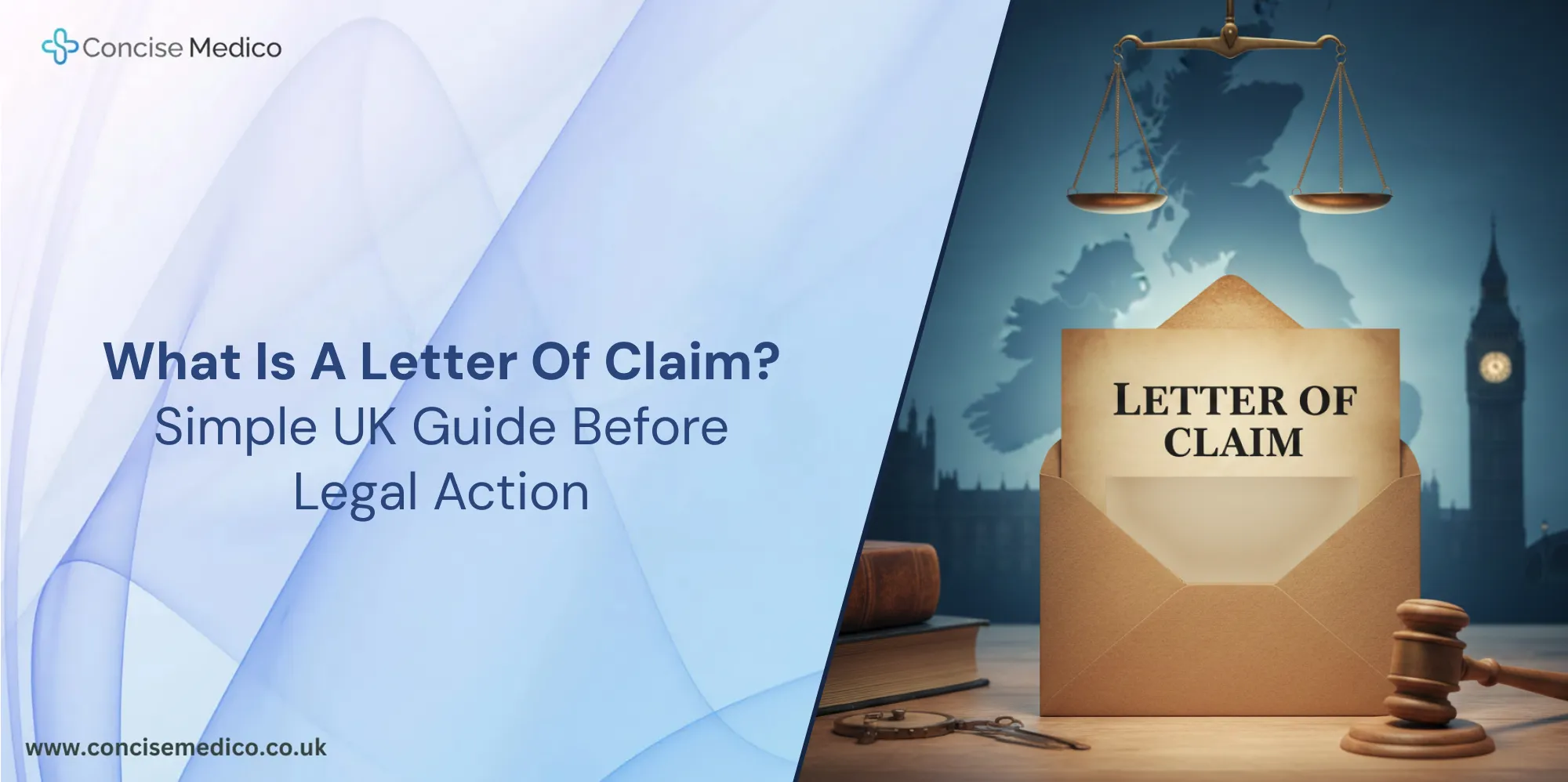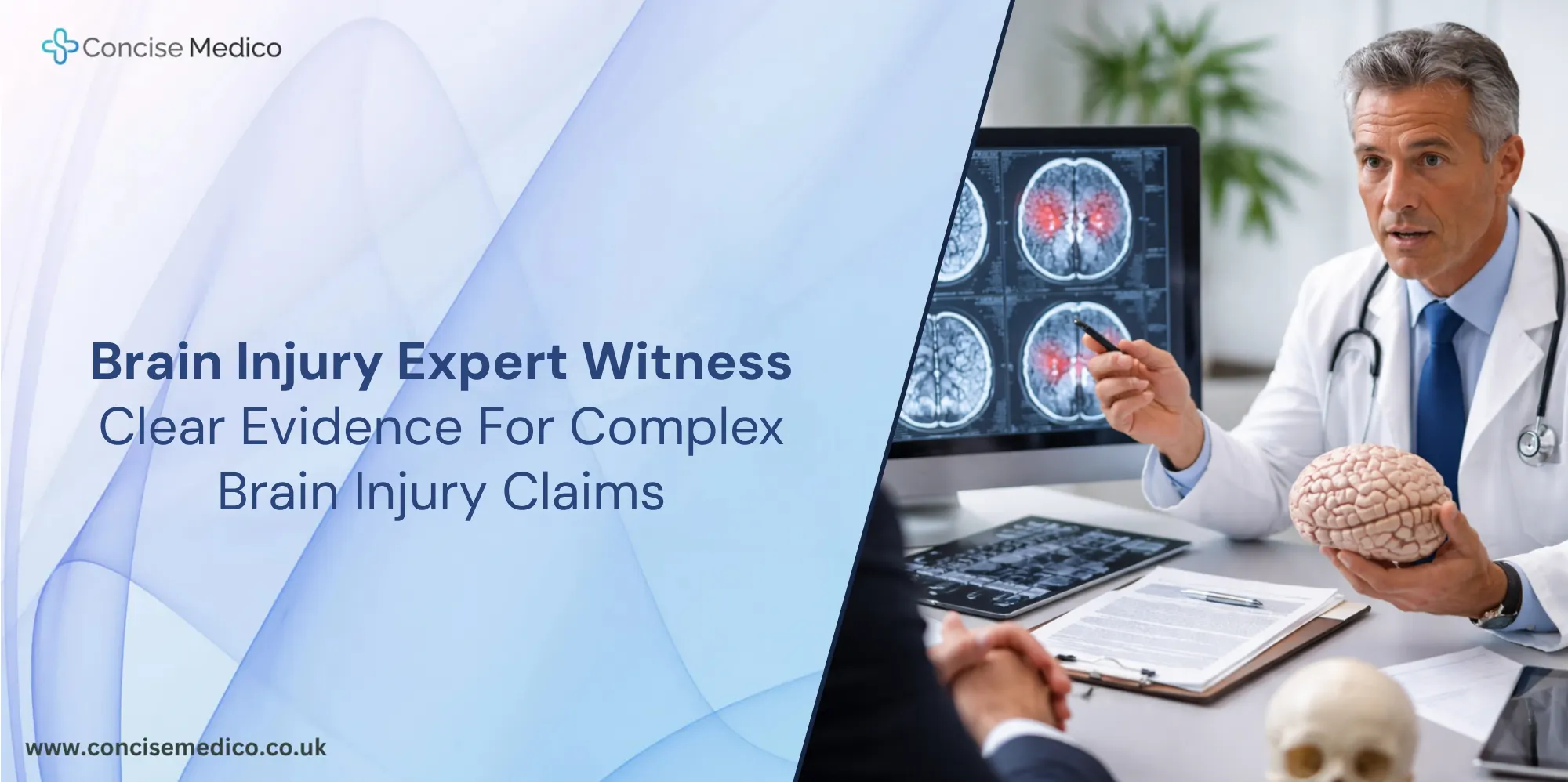TABLE OF CONTENT
- Why Ultrasound Matters in Legal Cases
- What is an Ultrasound Expert Witness
- Why Are Ultrasounds Used in Court?
- Legal Applications of Ultrasound Evidence
- Ultrasound in Medical Malpractice and Negligence Cases
- Ultrasound Reporting Standards for Legal Use
- Presenting Ultrasound as Legal Testimony
- Benefits of Using Ultrasound in Courtrooms
- A Vital Link Between Medicine and Law
- How Concise Medico Helps You?
- FAQs
Why Ultrasound Matters in Legal Cases
The role of an ultrasound expert witness is becoming essential in the UK legal system, as the ultrasound legal importance grows each year. Courts rely on medical imaging for more than just diagnosis. It also serves as clear evidence in complex cases. An ultrasound scan can reveal injuries or issues that may not emerge from verbal testimony. Legal professionals are turning to expert witnesses more often. They need help interpreting images in court.
“Ultrasound seems a promising but underutilised imaging tool in legal medicine to date.”
Mobius et al
In 2023, over 0.91 million ultrasound scans were performed in NHS England hospitals, covering a wide range of clinical needs. Many of these scans play a role in legal investigations. This applies mainly to injury cases, medical errors, and when diagnoses are in question. Experts review the scans. They look at timelines, damage, and medical conditions to check them visually.
Read more about what ultrasound scanning is?
What is an Ultrasound Expert Witness
An ultrasound expert witness is a trained radiologist or sonographer. They read scans and explain them to judges and juries. They back up legal claims with clear, honest facts. An expert ultrasound witness has:
- A valid medical license and ultrasound certification (e.g., ARDMS Registered Diagnostic Medical Sonographer certificate).
- Experience in medico legal reports that lay out what the scans show, why it matters, and how it supports the case.
- A skill for turning medical terms into plain speech so that judges, juries, and lawyers can easily understand the findings.
Their testimony makes the ultrasound scan a powerful part of any case.
Why Are Ultrasounds Used in Court?
The use of ultrasound scans in courtrooms is growing. Their many benefits make this clear:
Real-Time Visual Evidence
Ultrasounds show body changes as they happen. An expert ultrasound can point out internal bleeding or swelling. This view helps settle personal injury and emergency claims.
Safe and Non-Invasive
Ideal for legal cases involving children or pregnant women, since it uses harmless sound waves instead of radiation. An expert can document injuries, like concealed bleeding or soft-tissue damage, without any risk to the child or fetus. Most patients feel no pain or worry.
Strong Legal Value
Scans carry exact date and time stamps. An expert ultrasound checks the secure files and full report. This makes the proof hard to deny.
Easy to Explain
A radiology expert witness guides the court through each image. An expert ultrasound uses simple words to clear up complex findings.
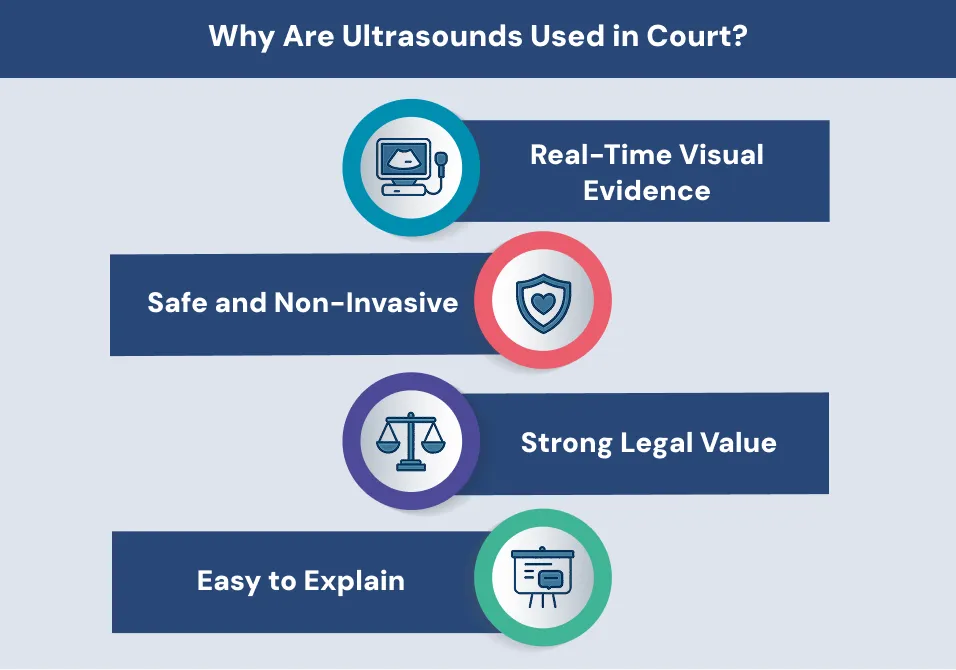
Legal Applications of Ultrasound Evidence
The following sections explain key ways ultrasound evidence is used in personal injury and medical malpractice cases:
1. How Ultrasound Evidence Supports Personal Injury and Criminal Claims
In personal injury cases, ultrasound reporting plays a vital role. Courts often need proof that an injury occurred, when it happened, and how severe it is. Ultrasound scans help answer these questions. Below are the injury cases in which ultrasound expert witness evidence is used to secure compensation and other legal outcomes.
Types of Personal Injury Cases Supported by Ultrasound Evidence
Road traffic accidents
Ultrasound can spot internal bleeding or organ damage after a crash. It helps show exactly where a seatbelt or impact hit the body.
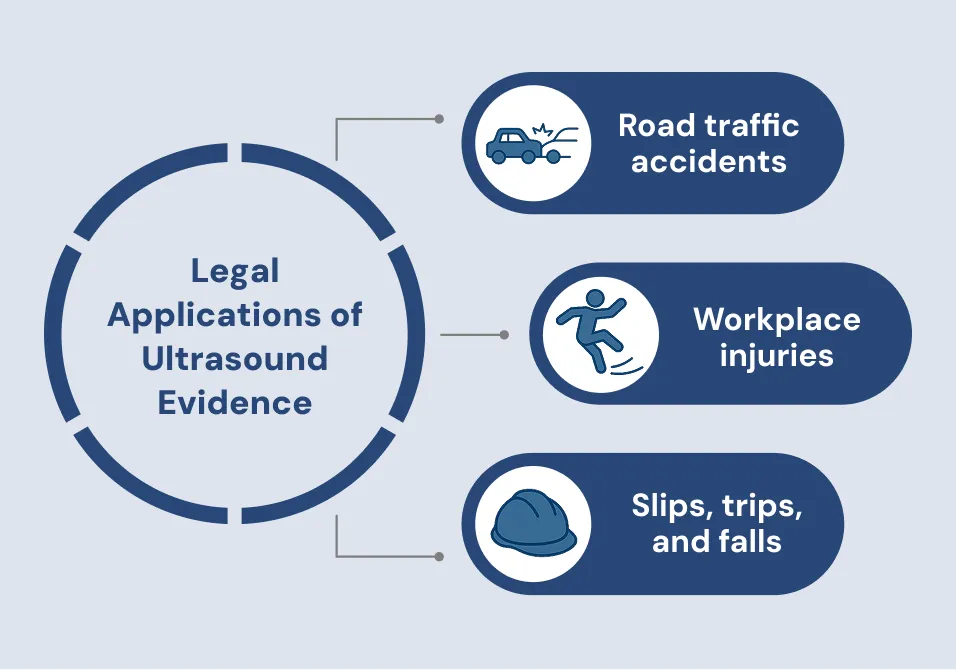
Workplace injuries
Ultrasound can reveal torn muscles or swollen tendons from lifting heavy objects. It provides clear proof of the injury without any surgery.
Slips, trips, and falls
Ultrasound can detect soft-tissue damage like sprains or bruising under the skin. It shows how deep the injury goes and how serious it is.
What Ultrasound Scans Can Prove
- Organ damage from blunt force trauma
- Swelling and soft tissue changes over time
- Internal injuries like muscle tears or bleeding such as in a car accident case, an ultrasound can reveal internal damage. Other imaging methods might not show this. These findings can affect the result of a compensation claim.
In court, these scans serve as visual proof. With an expert witness, these proofs can become strong tools for making a case.
2. Criminal Cases Supported by Ultrasound Evidence
Below are the cases in which ultrasound expert witness provide evidence through scan report:
Assault and battery cases
Ultrasound can detect hidden bruises and internal injuries from physical attacks. It helps prove that blunt force was used.
Child abuse
Ultrasound can reveal organ damage, bleeding, or fractures in children. It provides clear proof when injuries aren’t visible from the outside.
Sexual violence cases
Ultrasound can document internal injuries such as tears, bleeding, or swelling—after a sexual attack. This evidence can be crucial when external marks aren’t obvious.
Harassment with physical harm
In cases where harassment turns violent, ultrasound can show soft-tissue damage or internal bruising. It helps link the abusive act to the injuries sustained
Ultrasound in Medical Malpractice and Negligence Cases
Medical malpractice is when a doctor or healthcare provider fails to give patients the care they need. Ultrasound scans can reveal such failures.
Birth injury and obstetric litigation
Ultrasound helps lawyers show when problems with the baby or placenta were missed before birth.
- Cerebral palsy due to undiagnosed fetal distress: Scans can reveal when the baby was starved of oxygen, a sign doctors should have spotted.
- Placental insufficiency: Ultrasound can detect poor blood flow from the placenta that puts the baby at risk.
- Breech presentation or other positioning issues missed in scans. It shows if the baby’s position was dangerously wrong and went unreported.
- Wrongful birth claims: These cases hinge on what should have been seen, and shared, during prenatal care.
- Undetected congenital abnormalities: Ultrasound images can prove that birth defects were visible but not pointed out.
- Failure to inform parents in time: Expert testimony can show that critical findings were not communicated, denying families a choice.
In such cases, the radiology expert witness is key. They check if the ultrasound was done right, understood correctly, and acted on. Their opinion decides if a duty was breached and if harm was avoidable.
Know more about mental health misdiagnosis
Ultrasound Reporting Standards for Legal Use
For ultrasound scans to be accepted as evidence, they must meet strict medico legal guidelines. These include:
Imaging
Each image frame must be complete and unaltered, and an expert witness confirms no data is missing. This clear view shows exactly what was scanned. It leaves no room for doubt in court.
Timestamps
Every scan shows an exact date and time, which an expert uses to prove when it was taken. This links the image to the incident. It helps build a solid timeline.
Documentation
Reports include all measurements and notes, and an expert witness checks each detail for accuracy. Clear notes help lawyers and judges follow the findings. They can double-check any number or comment.
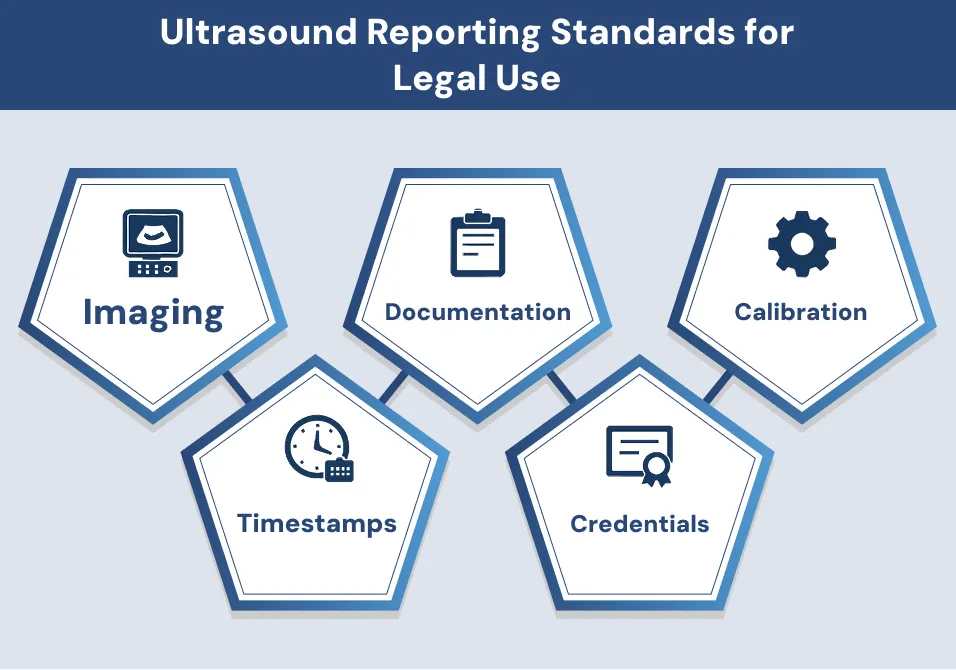
Credentials
A certified professional signs every report, and an ultrasound expert witness adds their own credentials to verify authenticity. This builds trust in the evidence. It shows the reader the person reading the scan is fully qualified.
Calibration
Machines receive regular tune-ups, and an expert witness reviews service logs to ensure they are up to date. This keeps every result reliable and true. It proves the machine worked right at the time of the scan.
If any step is missed, the court may toss out the evidence.
Presenting Ultrasound as Legal Testimony
Testimony is a formal statement by an expert about what the scan shows. Using an ultrasound scan as a testimony in court is more than displaying the image. It must be properly explained and verified.
Key Steps to Present Ultrasound as Testimony
Storage
Scans go into locked, audited systems. An ultrasound expert witness shows the chain of custody.
Clear Reporting
Each image links back to case facts. An ultrasound expert witness writes and signs the report.
Equipment Care
Machines get regular service checks. An ultrasound expert witness reviews the logs.
Record Match
Scan reports must match all patient files. An ultrasound expert witness spots any mismatch.
Having an ultrasound expert witness in court lets all sides ask questions. This makes the scan’s legal value clear.
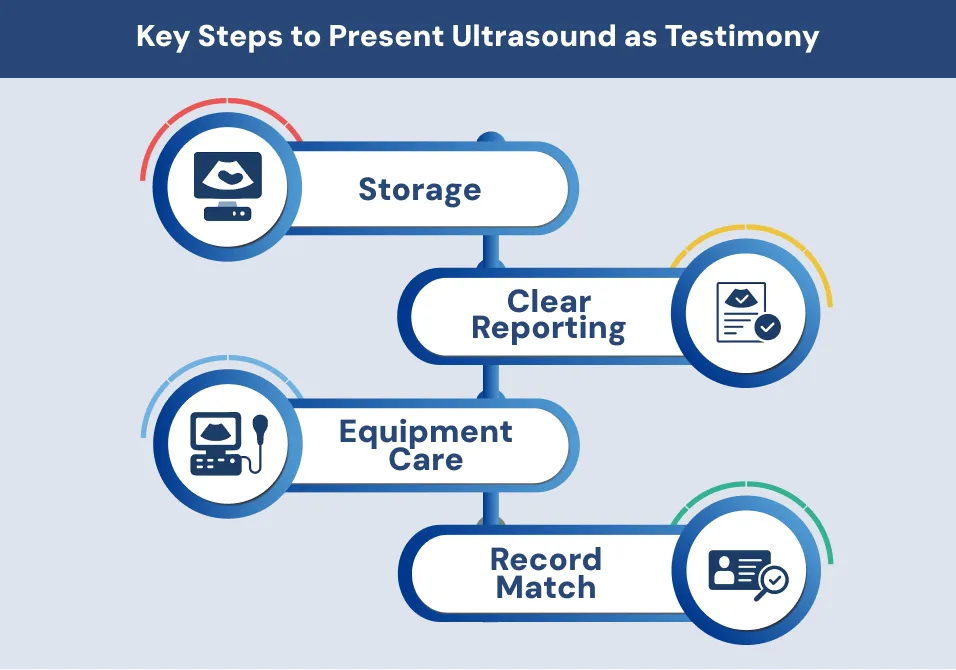
Benefits of Using Ultrasound in Courtrooms
Clarity
Judges and jurors see injuries directly on the scan. A specialist points out key areas, like where bleeding or tears appear. This clear view helps everyone understand the harm right away.
Credibility
An ultrasound expert witness with a valid certificate backs up the images. Their role adds weight to the evidence, so jurors know the findings come from a true professional.
Support for claims
Real-time images back up written accounts and doctor notes. An ultrasound expert witness ties what the scan shows to each legal claim. This visual link makes verbal testimony stronger.
MJF v University Hospitals Birmingham NHS Foundation Trust [2024] EWHC
The case involved MJF, who claimed negligent insertion of a feeding tube led to serious health decline. The court found the hospital breached care by over-tightening the PEG tube, causing tissue death and sepsis. An ultrasound expert witness confirmed the timing and impact of the injury.
Reduced uncertainty
Scans confirm exactly when an injury happened and how bad it is. A specialist explains these points in plain words. This clear timeline helps narrow down when harm occurred.
Ultrasound evidence is now a key part of legal strategies at many UK law firms.
A Vital Link Between Medicine and Law
The legal importance of ultrasound scans in the UK is growing. Medical imaging now plays a key role in legal decisions. Ultrasound scans play a key role in court. They help show injuries, find errors, and back up insurance claims.
How Concise Medico Helps You?
With help from a skilled ultrasound expert witness, these scans turn into facts, not just pictures. At Concise Medico, we provide ultrasound reporting and legal consultations that meet top quality standards. We make sure your case has strong evidence that is clear, legal, and true.
For trustworthy ultrasound services you can rely on in court, reach out to Concise Medico. Here, medical skill meets legal clarity.
FAQs
Why Ultrasound Matters in Legal Cases
The role of an ultrasound expert witness is becoming essential in the UK legal system, as the ultrasound legal importance grows each year. Courts rely on medical imaging for more than just diagnosis. It also serves as clear evidence in complex cases. An ultrasound scan can reveal injuries or issues that may not emerge from verbal testimony. Legal professionals are turning to expert witnesses more often. They need help interpreting images in court.
“Ultrasound seems a promising but underutilised imaging tool in legal medicine to date.”
Mobius et al
In 2023, over 0.91 million ultrasound scans were performed in NHS England hospitals, covering a wide range of clinical needs. Many of these scans play a role in legal investigations. This applies mainly to injury cases, medical errors, and when diagnoses are in question. Experts review the scans. They look at timelines, damage, and medical conditions to check them visually.
Read more about what ultrasound scanning is?
What is an Ultrasound Expert Witness
An ultrasound expert witness is a trained radiologist or sonographer. They read scans and explain them to judges and juries. They back up legal claims with clear, honest facts. An expert ultrasound witness has:
- A valid medical license and ultrasound certification (e.g., ARDMS Registered Diagnostic Medical Sonographer certificate).
- Experience in medico legal reports that lay out what the scans show, why it matters, and how it supports the case.
- A skill for turning medical terms into plain speech so that judges, juries, and lawyers can easily understand the findings.
Their testimony makes the ultrasound scan a powerful part of any case.
Why Are Ultrasounds Used in Court?
The use of ultrasound scans in courtrooms is growing. Their many benefits make this clear:
Real-Time Visual Evidence
Ultrasounds show body changes as they happen. An expert ultrasound can point out internal bleeding or swelling. This view helps settle personal injury and emergency claims.
Safe and Non-Invasive
Ideal for legal cases involving children or pregnant women, since it uses harmless sound waves instead of radiation. An expert can document injuries, like concealed bleeding or soft-tissue damage, without any risk to the child or fetus. Most patients feel no pain or worry.
Strong Legal Value
Scans carry exact date and time stamps. An expert ultrasound checks the secure files and full report. This makes the proof hard to deny.
Easy to Explain
A radiology expert witness guides the court through each image. An expert ultrasound uses simple words to clear up complex findings.

Legal Applications of Ultrasound Evidence
The following sections explain key ways ultrasound evidence is used in personal injury and medical malpractice cases:
1. How Ultrasound Evidence Supports Personal Injury and Criminal Claims
In personal injury cases, ultrasound reporting plays a vital role. Courts often need proof that an injury occurred, when it happened, and how severe it is. Ultrasound scans help answer these questions. Below are the injury cases in which ultrasound expert witness evidence is used to secure compensation and other legal outcomes.
Types of Personal Injury Cases Supported by Ultrasound Evidence
Road traffic accidents
Ultrasound can spot internal bleeding or organ damage after a crash. It helps show exactly where a seatbelt or impact hit the body.

Workplace injuries
Ultrasound can reveal torn muscles or swollen tendons from lifting heavy objects. It provides clear proof of the injury without any surgery.
Slips, trips, and falls
Ultrasound can detect soft-tissue damage like sprains or bruising under the skin. It shows how deep the injury goes and how serious it is.
What Ultrasound Scans Can Prove
- Organ damage from blunt force trauma
- Swelling and soft tissue changes over time
- Internal injuries like muscle tears or bleeding such as in a car accident case, an ultrasound can reveal internal damage. Other imaging methods might not show this. These findings can affect the result of a compensation claim.
In court, these scans serve as visual proof. With an expert witness, these proofs can become strong tools for making a case.
2. Criminal Cases Supported by Ultrasound Evidence
Below are the cases in which ultrasound expert witness provide evidence through scan report:
Assault and battery cases
Ultrasound can detect hidden bruises and internal injuries from physical attacks. It helps prove that blunt force was used.
Child abuse
Ultrasound can reveal organ damage, bleeding, or fractures in children. It provides clear proof when injuries aren’t visible from the outside.
Sexual violence cases
Ultrasound can document internal injuries such as tears, bleeding, or swelling—after a sexual attack. This evidence can be crucial when external marks aren’t obvious.
Harassment with physical harm
In cases where harassment turns violent, ultrasound can show soft-tissue damage or internal bruising. It helps link the abusive act to the injuries sustained
Ultrasound in Medical Malpractice and Negligence Cases
Medical malpractice is when a doctor or healthcare provider fails to give patients the care they need. Ultrasound scans can reveal such failures.
Birth injury and obstetric litigation
Ultrasound helps lawyers show when problems with the baby or placenta were missed before birth.
- Cerebral palsy due to undiagnosed fetal distress: Scans can reveal when the baby was starved of oxygen, a sign doctors should have spotted.
- Placental insufficiency: Ultrasound can detect poor blood flow from the placenta that puts the baby at risk.
- Breech presentation or other positioning issues missed in scans. It shows if the baby’s position was dangerously wrong and went unreported.
- Wrongful birth claims: These cases hinge on what should have been seen, and shared, during prenatal care.
- Undetected congenital abnormalities: Ultrasound images can prove that birth defects were visible but not pointed out.
- Failure to inform parents in time: Expert testimony can show that critical findings were not communicated, denying families a choice.
In such cases, the radiology expert witness is key. They check if the ultrasound was done right, understood correctly, and acted on. Their opinion decides if a duty was breached and if harm was avoidable.
Know more about mental health misdiagnosis
Ultrasound Reporting Standards for Legal Use
For ultrasound scans to be accepted as evidence, they must meet strict medico legal guidelines. These include:
Imaging
Each image frame must be complete and unaltered, and an expert witness confirms no data is missing. This clear view shows exactly what was scanned. It leaves no room for doubt in court.
Timestamps
Every scan shows an exact date and time, which an expert uses to prove when it was taken. This links the image to the incident. It helps build a solid timeline.
Documentation
Reports include all measurements and notes, and an expert witness checks each detail for accuracy. Clear notes help lawyers and judges follow the findings. They can double-check any number or comment.

Credentials
A certified professional signs every report, and an ultrasound expert witness adds their own credentials to verify authenticity. This builds trust in the evidence. It shows the reader the person reading the scan is fully qualified.
Calibration
Machines receive regular tune-ups, and an expert witness reviews service logs to ensure they are up to date. This keeps every result reliable and true. It proves the machine worked right at the time of the scan.
If any step is missed, the court may toss out the evidence.
Presenting Ultrasound as Legal Testimony
Testimony is a formal statement by an expert about what the scan shows. Using an ultrasound scan as a testimony in court is more than displaying the image. It must be properly explained and verified.
Key Steps to Present Ultrasound as Testimony
Storage
Scans go into locked, audited systems. An ultrasound expert witness shows the chain of custody.
Clear Reporting
Each image links back to case facts. An ultrasound expert witness writes and signs the report.
Equipment Care
Machines get regular service checks. An ultrasound expert witness reviews the logs.
Record Match
Scan reports must match all patient files. An ultrasound expert witness spots any mismatch.
Having an ultrasound expert witness in court lets all sides ask questions. This makes the scan’s legal value clear.

Benefits of Using Ultrasound in Courtrooms
Clarity
Judges and jurors see injuries directly on the scan. A specialist points out key areas, like where bleeding or tears appear. This clear view helps everyone understand the harm right away.
Credibility
An ultrasound expert witness with a valid certificate backs up the images. Their role adds weight to the evidence, so jurors know the findings come from a true professional.
Support for claims
Real-time images back up written accounts and doctor notes. An ultrasound expert witness ties what the scan shows to each legal claim. This visual link makes verbal testimony stronger.
MJF v University Hospitals Birmingham NHS Foundation Trust [2024] EWHC
The case involved MJF, who claimed negligent insertion of a feeding tube led to serious health decline. The court found the hospital breached care by over-tightening the PEG tube, causing tissue death and sepsis. An ultrasound expert witness confirmed the timing and impact of the injury.
Reduced uncertainty
Scans confirm exactly when an injury happened and how bad it is. A specialist explains these points in plain words. This clear timeline helps narrow down when harm occurred.
Ultrasound evidence is now a key part of legal strategies at many UK law firms.
A Vital Link Between Medicine and Law
The legal importance of ultrasound scans in the UK is growing. Medical imaging now plays a key role in legal decisions. Ultrasound scans play a key role in court. They help show injuries, find errors, and back up insurance claims.
How Concise Medico Helps You?
With help from a skilled ultrasound expert witness, these scans turn into facts, not just pictures. At Concise Medico, we provide ultrasound reporting and legal consultations that meet top quality standards. We make sure your case has strong evidence that is clear, legal, and true.
For trustworthy ultrasound services you can rely on in court, reach out to Concise Medico. Here, medical skill meets legal clarity.

